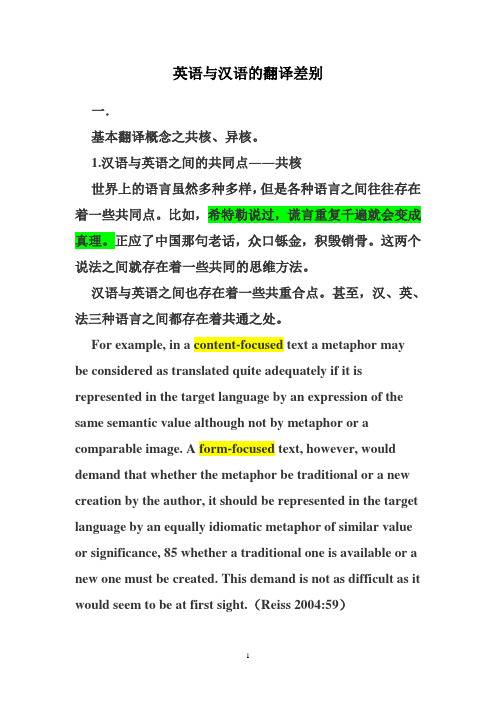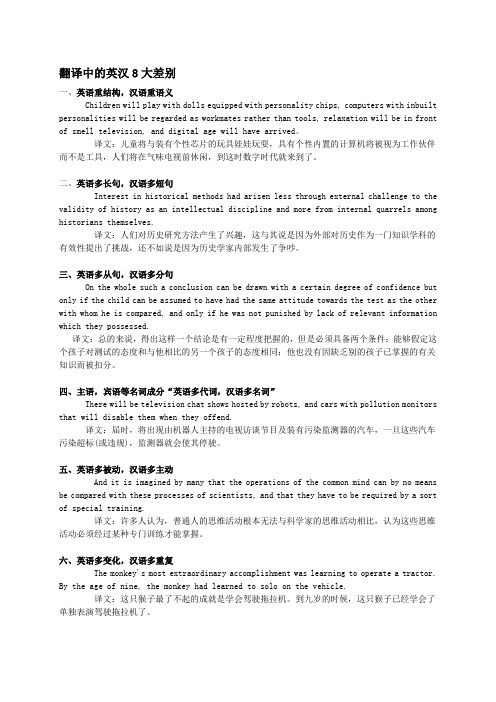英汉翻译差异
英语与汉语的翻译差别

英语与汉语的翻译差别一.基本翻译概念之共核、异核。
1.汉语与英语之间的共同点――共核世界上的语言虽然多种多样,但是各种语言之间往往存在着一些共同点。
比如,希特勒说过,谎言重复千遍就会变成真理。
正应了中国那句老话,众口铄金,积毁销骨。
这两个说法之间就存在着一些共同的思维方法。
汉语与英语之间也存在着一些共重合点。
甚至,汉、英、法三种语言之间都存在着共通之处。
For example, in a content-focused text a metaphor may be considered as translated quite adequately if it is represented in the target language by an expression of the same semantic value although not by metaphor or a comparable image. A form-focused text, however, would demand that whether the metaphor be traditional or a new creation by the author, it should be represented in the target language by an equally idiomatic metaphor of similar value or significance, 85 whether a traditional one is available or a new one must be created. This demand is not as difficult as it would seem to be at first sight.(Reiss 2004:59)Reiss 认为不同语言之间存在着一些比喻意义相同的说法,并在注释中举出了一个例子“Quel bon vent vous amène! (What good wind brings you here!)”。
英汉翻译的8大差异

翻译中的英汉8大差别一、英语重结构,汉语重语义Children will play with dolls equipped with personality chips, computers with inbuilt personalities will be regarded as workmates rather than tools, relaxation will be in front of smell television, and digital age will have arrived。
译文:儿童将与装有个性芯片的玩具娃娃玩耍,具有个性内置的计算机将被视为工作伙伴而不是工具,人们将在气味电视前休闲,到这时数字时代就来到了。
二、英语多长句,汉语多短句Interest in historical methods had arisen less through external challenge to the validity of history as an intellectual discipline and more from internal quarrels among historians themselves.译文:人们对历史研究方法产生了兴趣,这与其说是因为外部对历史作为一门知识学科的有效性提出了挑战,还不如说是因为历史学家内部发生了争吵。
三、英语多从句,汉语多分句On the whole such a conclusion can be drawn with a certain degree of confidence but only if the child can be assumed to have had the same attitude towards the test as the other with whom he is compared, and only if he was not punished by lack of relevant information which they possessed.译文:总的来说,得出这样一个结论是有一定程度把握的,但是必须具备两个条件:能够假定这个孩子对测试的态度和与他相比的另一个孩子的态度相同;他也没有因缺乏别的孩子已掌握的有关知识而被扣分。
中文常见成语的英文翻译与英汉差异

中文常见成语的英文翻译与英汉差异爱屋及乌Love me, love my dog.百闻不如一见One look is worth a thousand words.比上不足,比下有余To fall short of the best, but be better than the worst.笨鸟先飞A slow sparrow should make an early start.不遗余力Spare no effort; go all out; do one's best.不打不成交No discord, no concord.拆东墙补西墙Rob Peter to pay Paul.辞旧迎新Bid farewell to the old and usher in the new.大事化小,小事化了Try first to make their mistake sound less serious and then to reduce it to nothing at all.大开眼界Broaden one's horizon; be an eye-opener.国泰民安The country flourishes and people live in peace.过犹不及Going beyond the limit is as bad as falling short;excess is just as bad as deficiency;too much is as bad as too little.好了伤疤忘了疼Once on shore, one prays no more.好事不出门,坏事传千里Bad news travels fast.和气生财Harmony brings wealth;friendliness is conducive to business success.活到老学到老Never too old to learn.既往不咎Let bygones be bygones.金无足赤,人无完人There are spots even on the sun.金玉满堂Treasures fill the home.脚踏实地Be down-to-earth.脚踩两只船Sit on the fence; be a fence-sitter; have a foot in either camp. 君子之交淡如水A hedge between keeps friendship green.已成定局Cut and dried.礼尚往来Courtesy calls for reciprocity.留得青山在,不怕没柴烧Where there is life, there is hope.马到成功Achieve immediate victory; win instant success.名利双收Gain both fame and wealth.茅塞顿开Be suddenly enlightened.没有规矩,不成方圆Nothing can be accomplished without norms or standards.每逢佳节倍思亲On festive occasions more than ever one thinks of one's dear ones far away. 谋事在人,成事在天Man proposes; God disposes.弄巧成拙Make a fool of oneself in trying to be smart.赔了夫人又折兵Suffer a double loss; lose the bait along with the fish.抛砖引玉A modest spur to induce others to come forward with valuable contributions; throw a sprat to catch a mackerel.破釜沉舟Cut off all means of retreat;burn one's own way of retreat and be determined to fight to the end.抢得先机Take the preemptive opportunities.巧妇难为无米之炊One can't make bricks without straw.千里之行始于足下A thousand-li journey begins with the first step--the highest eminence is to be gained step by step.前事不忘,后事之师Past experience, if not forgotten, is a guide for the future.前怕狼,后怕虎Fear wolves ahead and tigers behind; hesitate in doing something.强龙难压地头蛇The mighty dragon is no match for the native serpent.瑞雪兆丰年A fall of seasonal snow gives promise of a fruitful year.人逢喜事精神爽People are in high spirits when involved in happy events.世上无难事,只怕有心人Where there is a will, there is a way.世外桃源A retreat away from the turmoil of the world.人之初,性本善Humans are born good.上有天堂,下有苏杭Just as there is paradise in heaven, there are Suzhou and Hangzhou on earth 塞翁失马,焉知非福A blessing in disguise;Every cloud has a silver lining.三十而立A man should be independent at the age of thirty. /At thirty, a man should be able to think for himself.水涨船高A ship rises with the tide时不我待Time and tide wait for no man.杀鸡用牛刀Use a steam-hammer to crack nuts.实事求是Seek truth from facts; be practical and realistic; be true to facts.说曹操,曹操到Speak of the devil.实话实说Speak the plain truth; call a spade a spade; tell it as it is.实践是检验真理的唯一标准Practice is the sole criterion for testing truth.韬光养晦Hide one's capacities and bide one's time.糖衣炮弹Sugar-coated bullets.天有不测风云Anything unexpected may happen. a bolt from the blue.团结就是力量Unity is strength.跳进黄河洗不清Even if one jumped into the Yellow River, one can not wash oneself clean - there's nothing one can do to clear one's name歪风邪气Unhealthy trends and vulgar practices.物以类聚,人以群分Birds of a feather flock together.望子成龙Hold high hopes for one's child.唯利是图Seek nothing but profits; be blind to all but one's own interests.无中生有A sheer fabrication out of nothing; fabricate rumors out of thin air.无风不起浪There are no waves without wind. Nothing comes of nothing.徇私枉法Twist the law to suit one's own purpose.新官上任三把火A new broom sweeps clean.蓄势待发Accumulate strength for a take-off.心想事成May all your wish come true.心照不宣Have a tacit understanding; thoroughly understand each other, without havingexchanged a word of explanation.先入为主First impressions are firmly entrenched.先下手为强He who strikes first gains the advantage.The best defense is offense.热锅上的蚂蚁Ants on a hot pan现身说法Warn people by taking oneself as an example.息事宁人Pour oil on troubled waters; patch up a quarrel and reconcile the parties concerned. 循序渐进Proceed in an orderly way and step by step; advance gradually in due order.严以律己,宽以待人Be strict with oneself and lenient with others.有情人终成眷属Jack shall have Jill, all shall be well.有钱能使鬼推磨Money makes the mare go./ Money talks.有识之士A man of insight.有勇无谋Bold but not crafty.有缘千里来相会Separated as we are thousands of miles apart, we come together as if by predestination.与时俱进Keep pace with the times.以人为本People-oriented.因材施教Teach students according to their aptitude.欲穷千里目,更上一层楼To ascend another storey to see a thousand miles further; Ascend further, were you to look farther.欲速则不达Haste makes waste.More haste, less speed.优胜劣汰Survival of the fittest.英雄所见略同Great minds think alike.冤家宜解不宜结Better make friends than make enemies.冤假错案Cases in which people were unjustly, falsely or wrongly charged or sentenced; unjust, false or wrong cases.一言既出,驷马难追A promise is a promise.A real man never goes back on his words.招财进宝Bring in wealth and treasure.债台高筑Become debt-ridden.众矢之的Target of public criticism.纸上谈兵Be an armchair strategist.纸包不住火You can't wrap fire in paper.What's done by night appears by day.左右为难Caught in a dilemma; between the devil and the deep blue sea.英语学习应注意的英汉差异英语重形合(hypotaxis),汉语重意合(parataxis) 。
2024年浅析英汉互译中的文化差异

2024年浅析英汉互译中的文化差异英汉互译不仅是语言的转换,更是文化的交流。
由于英汉两种语言所属的文化背景、历史传统、价值观念等存在显著差异,翻译过程中往往会遇到诸多挑战。
本文旨在探讨英汉互译中的文化差异,并分析如何在翻译中妥善处理这些差异。
一、语言习惯差异英汉两种语言在语法结构、句子构造和表达习惯上存在明显的不同。
英语注重形式逻辑,句子结构严谨,常使用长句和复合句;而汉语则更注重意合,句子简短明了,多使用并列结构和流水句。
在翻译时,需要灵活调整句子结构,以适应目的语的表达习惯。
例如,英语中的定语从句和状语从句在汉语中可能需要转化为独立句或者前置修饰语,以确保译文的流畅和自然。
二、词汇文化内涵词汇是语言的基本单位,也是文化信息的载体。
英汉两种语言中的词汇往往承载着不同的文化内涵。
一些在英语中具有特定文化背景的词汇,在汉语中可能找不到完全对应的表达。
反之亦然。
在翻译时,需要深入了解词汇的文化内涵,选择恰当的译文,避免误解和歧义。
例如,“dragon”在英语中通常代表着邪恶和凶猛,而在汉语中则是吉祥和力量的象征。
因此,在翻译时需要充分考虑目标语言读者的文化认知,以避免产生误解。
三、习语与俚语翻译习语和俚语是语言中富有表现力的部分,它们通常蕴含着丰富的文化内涵和历史背景。
英汉两种语言中都有大量的习语和俚语,这些表达在直译时往往难以传达原文的含义。
因此,在翻译时需要对习语和俚语进行深入的研究和理解,找出它们在不同文化中的对应表达或者采用意译的方式传达原文的语义和情感色彩。
同时,还需要注意保持原文的风格和韵律美感,以使译文更具吸引力和感染力。
四、思维方式的差异英汉两种语言使用者的思维方式也存在差异。
英语国家的人们往往更注重逻辑分析和形式推理,而汉语国家的人们则更注重整体思维和直观感悟。
这种差异在翻译中表现为对同一事物的描述和表达方式的不同。
因此,在翻译时需要充分考虑目标语言读者的思维习惯,适当调整表达方式,以使译文更符合目标语言读者的阅读习惯和审美需求。
英汉翻译中的句子结构差异分析

英汉翻译中的句子结构差异分析
1. 英语中主语+谓语+宾语的结构在汉语中常被翻译为主语+宾语+谓语的结构。
例如:英语句子 "I drink tea" 在汉语中翻译为 "我喝茶"。
2. 汉语中的定语一般放在被修饰的名词之前,而英语中的定语一般放在被修饰的名词之后。
例如:英语句子 "a red car" 在汉语中翻译为"一辆红色的车"。
3. 汉语中的状语位置较为灵活,可以放在句首、句中或句尾,而英语中的状语一般放在句尾。
例如:英语句子 "I often go to the park" 在汉语中翻译为 "我经常去公园"。
4. 英语中存在被动语态,而汉语中没有被动语态,因此在翻译时需要将被动语态转换为主动语态。
例如:英语句子 "The book was written by him" 在汉语中翻译为 "他写的书"。
5. 汉语中的句子通常比英语中的句子更加简洁,在翻译时可能需要增加一些修饰语或补充语来传达完整的意思。
例如:英语句子 "He is a teacher" 在汉语中翻译为 "他是一位老师"。
以上只是一些常见的句子结构差异,实际翻译时还会受到具体语境和文化差异的影响。
正确的翻译需要考虑词语选择、语序调整和意义传递等因素。
英汉文化差异对翻译的影响

英汉文化差异对翻译的影响作为语言学习者,我们都知道语言和文化是密不可分的。
每种语言都反映了其所在文化的思维方式、价值观和世界观。
在翻译过程中,英汉文化差异对翻译的影响不可忽视。
本文将从不同层面探讨这一问题。
一、语言层面英汉两种语言的基础词汇和语法结构有很大差异。
例如英语的动词时态非常丰富,而中文则使用助词表示时态。
这就导致了在翻译过程中,英文句子可能需要在语法和逻辑层面做出调整才能更准确地表达中文原意。
同时,两种语言的词汇中也存在很大差异。
中文中通常使用成语、典故等表达方式,而英语的表达方式更倾向于实用性。
在翻译过程中, translators 需要注意不能只字翻译,而要根据目标语言读者习惯进行适当调整和转换。
二、文化层面除了语言差异之外,不同文化间的差异也会对翻译造成影响。
首先,英汉两种文化的思维方式有所不同。
中文文化注重人际关系的建立,而英语文化更强调个体主义。
因此在翻译中,如果将一个英语句子中的个体主义理解为中文文化中的人际关系,就会使原意产生严重误解。
其次,不同文化中存在着很多不同的象征意义。
例如中文中的“狗尾巴草”就有“愚弄人”的意思,而在英语中“dog's tail grass”则只是一种植物的名字。
在翻译过程中, translators 需要对这些差异进行挖掘和理解,才能更好地传达原意。
三、社会层面不同的社会背景、习惯和风俗也会对翻译产生积极或消极影响。
例如,在英语中“United Nations”通称为“UN”,而在中文中则通常直接称为“联合国”。
这是因为中文中通常不使用缩写,因此在翻译过程中也不能直接将英语缩写翻译成中文。
此外,不同地域、不同国家的表达方式也有所不同。
例如在英国,男女年龄相差较大的情侣被称为“couple”,而在中国这种情况通常被称为“老少配”。
在翻译过程中,translators 需要对这些区别进行注意和把握。
结论总的来说,英汉文化差异对翻译的影响不可避免。
英汉互译中的思维差异对比分析

英汉互译中的思维差异对比分析英汉语言作为中西方思维方式的具体体现,有着很大的不同。
要在翻译中灵活转换,就很有必要首先弄清楚其思维模式方面的差异。
标签:思维模式;思维差异;英汉互译很多学者认为,思维方式与语言密切相关,“思维是语言生成和发展的深层机制,语言又促使思维方式得以形成和发展。
语言是思维的主要工具,是思维方式的构成要素。
思维以一定的方式体现出来,表现于某种语言形式之中”。
(连淑能,2002)。
东方和西方属于两大不同的文化体系,因而形成两大类型的思维模式。
东方和西方的思维模式从总体上看具有不同的特征,如东方人偏重人文,注重伦理、道德西方人偏重理性、逻辑、实证等等。
英汉互译中语言转换很大程度上受英汉思维模式的影响,具体而言体现在以下四个方面:一、整体思维VS 分析思维(Synthetic thought VS Analytic thought)一般来看,中国人倾向于整体思维。
而英语国家的人则恰恰相反,会将整体分解成具体的部分,然后分析其特征、功用、关系等。
中国人计算时间一般按照年-月-日-小时-分钟从大到小的顺序,而英语中则从小到大,分钟-小时-日-月-年;中国人的名字一般将姓置于前,名放在后,而英语国家的人名顺序是先名后姓。
二、形象思维VS 抽象思维(Imaging thought VS Abstract thought)中国人往往选择形象思维,西方人选择的抽象思维。
中国的文字是一种象形文字,其很大程度上决定了中国人会选择形象思维,例如,“人”、“田”、“山”等;而英语是一种字母文字,其需要借助于抽象思维的方式来表达含义。
例1:Now that the merger of “dot and com” has created so many young millionaires,there’s a new topic:venture capital.译文:既然网络公司的兼并造就了如此多的年轻百万富翁,我们面临一个新话题:风险资本。
英汉翻译中的文化差异与解决方案

英汉翻译中的文化差异与解决方案在当前全球化的背景下,英汉翻译在跨文化交流中扮演着越来越重要的角色。
在这个过程中,文化差异成为了最大的问题之一。
由于汉语和英语的文化背景、历史渊源、社会体制、思维方式等方面的差异,翻译难度逐渐增加。
本文将探讨英汉翻译中的文化差异,并提出相应解决方案。
一、文化差异对英汉翻译的影响文化差异是英汉翻译中不能避免的存在。
这种差异对翻译有很大的影响,主要表现在以下三个方面。
1、语言表达的差异汉语和英语在语法结构、词汇、词序、语态等方面存在非常大的差异。
例如,在英语中,句子强调部分放在句首,而在汉语中放在句尾。
这种差异使得翻译中的语言表达非常困难。
2、逻辑思维的差异汉语和英语的思维方式存在差异。
英语思维方式较为逻辑,重视事物之间的因果关系,而汉语思维方式则较为象征与比喻,强调意象和情感。
这种差异会影响到译者对语言的理解、选择和表达,导致翻译的精度和准确性下降。
3、文化内涵的差异汉语和英语之间还存在文化差异。
汉语文化历史悠久,注重传统伦理道德和家庭观念,而英语文化则更加开放多元,讲究个人自由与权利。
这种文化差异会涉及到翻译中的词汇选择、语言表达、社会价值观念等方面。
二、解决方案为了在英汉翻译中有效解决文化差异问题,以下方案可以提供一些帮助。
1、读懂原文在英汉翻译中,译者必须先理解原文的文化特点和背景知识。
只有读懂原文,才能有效地翻译出高质量的译文。
2、适度的文化调整在翻译时,译者应根据目标语言的受众和文化内涵适度地对原文进行调整。
例如,将饮食和节日的翻译调整为与受众文化相符的词汇和表述方式,从而使其更容易为读者所接受和理解。
3、避免直译直译是指将原文的词汇、语法结构和语言风格等直接转换成目标语言的方式。
在翻译中,直译往往会导致译文的意思不准确或者表达方式拗口,因此应该尽量避免直译的方法。
4、加大文化学习与交流英汉翻译中文化差异的问题需要通过增加语言学习与文化交流来进行解决。
翻译者需要加强对源语言和目标语言的学习,了解不同文化之间的异同,从而提升翻译质量和跨文化交流能力。
- 1、下载文档前请自行甄别文档内容的完整性,平台不提供额外的编辑、内容补充、找答案等附加服务。
- 2、"仅部分预览"的文档,不可在线预览部分如存在完整性等问题,可反馈申请退款(可完整预览的文档不适用该条件!)。
- 3、如文档侵犯您的权益,请联系客服反馈,我们会尽快为您处理(人工客服工作时间:9:00-18:30)。
英译汉,“人称”代替“物称”
• It never occurred to me that she was so dishonest. • 我从来也没有想到她这么不老实.
• In 1958, there was a strike participated in by five thousand workers.
outburst.
总结 英语的非人称倾向(depersonalization)反
映了西方人的客体意识。
汉语的人称倾向反映了中国人的主体意识。
thank
That’s all,
you!!
礼的
物称和人称的概念
• 物称(Impersonal subject),是指 用无生命的、抽象的事物或概念做部 分动词的主语。
• 人称(Personal subject),是指用 有生命的人或动物做其逻辑动词的主 语。
非人称表达法---------英语常见的一种文风。
• 书面语,如公文、新闻、科技论著以及散文、小
• 1958年,五千个工人参加了一次罢工.
汉译英,“物称” 代替“人称”
• 一看到那棵大树,我便想起了童年的情景。 • The sight of the big tree always reminds me of my
childhood.
• 发怒之后,我不难过,也不后悔。 • Neither sorrow nor regret followed my passionate
English: Impersonal Chinese: Personal
英语重物称 汉语重人称
• impersonal
• [ɪm'pɜ:sənəl] • adj.不受个人情感影响的,冷淡的;客观的 • n. 与个人无关 • adv. 冷淡地;客观地
• personal
• ['pə:sənəl] • adj.个人的; 私人的;亲自的;人身攻击的, 无
说等文学作品。
• 客观、冷静,结构严谨、紧凑,语气委婉、间接。
Subject
Example: Impersonal 非人称主语
什么事情发生 在什么人身上
Words fail me! 我(吓得 / 惊得)就是说不出话来!
Personal 人称 主语
什么人怎么样了
英译汉,“人称”代替“物称”
• An idea suddenly struck me. • 我突然想到了一个主意. • Not a sound reached our ears. • 我们什么也没听到.
